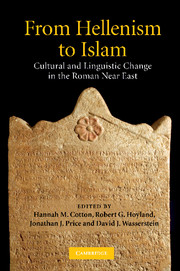Book contents
- Frontmatter
- Contents
- List of figures
- List of tables
- List of contributors
- Preface
- List of abbreviations
- Introduction: documentary evidence, social realities and the history of language
- Part I THE LANGUAGE OF POWER: LATIN IN THE ROMAN NEAR EAST
- 1 The presence, role and significance of Latin in the epigraphy and culture of the Roman Near East
- 2 Latin in cities of the Roman Near East
- Part II SOCIAL AND LEGAL INSTITUTIONS AS REFLECTED IN THE DOCUMENTARY EVIDENCE
- Part III THE EPIGRAPHIC LANGUAGE OF RELIGION
- Part IV LINGUISTIC METAMORPHOSES AND CONTINUITY OF CULTURES
- Part V GREEK INTO ARABIC
- Index
1 - The presence, role and significance of Latin in the epigraphy and culture of the Roman Near East
Published online by Cambridge University Press: 01 March 2010
- Frontmatter
- Contents
- List of figures
- List of tables
- List of contributors
- Preface
- List of abbreviations
- Introduction: documentary evidence, social realities and the history of language
- Part I THE LANGUAGE OF POWER: LATIN IN THE ROMAN NEAR EAST
- 1 The presence, role and significance of Latin in the epigraphy and culture of the Roman Near East
- 2 Latin in cities of the Roman Near East
- Part II SOCIAL AND LEGAL INSTITUTIONS AS REFLECTED IN THE DOCUMENTARY EVIDENCE
- Part III THE EPIGRAPHIC LANGUAGE OF RELIGION
- Part IV LINGUISTIC METAMORPHOSES AND CONTINUITY OF CULTURES
- Part V GREEK INTO ARABIC
- Index
Summary
The following story told by Cassius Dio is often repeated. In AD 43, after the emperor Claudius provincialised the territory of the Lycian Koinon on account of internal unrest, an embassy of Lycians appeared before the Senate in Rome. In the course of the discussion it happened that one of the ambassadors did not understand the question posed by Claudius in Latin. In consequence Claudius deprived him of the Roman citizenship, maintaining that no one could be a Roman citizen who did not also understand Rome's language. We may get the impression that command of Latin was required of a Roman citizen, or was a prerequisite in order to become one. In fact nothing of the sort was true under Claudius or any other Roman emperor, as is implied in another story from the same reign preserved by the same author. Soon after assuming power Claudius saw a theatrical performance of a Pyrrhic dance by young people whom Caligula had brought from Achaia. After the performance Claudius bestowed the Roman citizenship on the troupe and sent it home. It is of course unlikely that any of the young men knew any Latin. Nonetheless the Roman citizenship was given not only to them but also to their relatives: parents, siblings, as well as grandparents and great uncles – as witnessed in the many inscriptions from Achaia which mention the family of T. Statilius Lamprias who died at the age of 18. This young man happened to be one of the dancers whom Claudius rewarded with the Roman citizenship.
- Type
- Chapter
- Information
- From Hellenism to IslamCultural and Linguistic Change in the Roman Near East, pp. 15 - 42Publisher: Cambridge University PressPrint publication year: 2009
- 13
- Cited by



